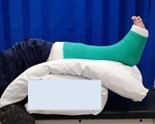Neurodiversity information for parents and young people
Your stay in hospital after surgery
- Your length of stay in the hospital will vary depending on the type of procedure and your recovery.
- Once you are medically stable and everything is in place to maintain your safety at home, we will discharge you from hospital.
- Your nurse will confirm the details of your discharge date with you.
- In some instances where you have a medical need, we can arrange hospital transport for you.
What happens on discharge day
Important
You will need to arrange for a family member, carer or friend to take you home on the day of discharge.
On the day of discharge you can expect the following.
Medication
- Your nurse will give you the medicine(s) you need to take when you are back home. Your nurse will explain what these are for and how to take them before you leave hospital.
Outpatient appointment
- Your consultant will confirm if and when they need to see you again in our outpatient clinic.
- If you do need an outpatient appointment, we will confirm the date before you are discharged from the hospital.
- If you attend the outpatient clinic, you will need to arrange your own transport. In some instances where you have a medical need, we can arrange hospital transport for you.
Discharge summary
- We will give you a summary of the treatment and care you have received in hospital and your ongoing treatment plan.
- We will send a copy of this to your GP.
Home care information
- We will give you information on how to take care of yourself at home. This may include exercises that we recommend and other services that you can access.
What to expect while recovering at home
Following your surgery you can expect the following.
- You will need to elevate your injured limb for a period of time. Your medical team will discuss this with you.

- You may be wearing a plaster cast or splint to help reduce the movement of your limb and this will help with your recovery.
Pain
- Following surgery you are likely to experience some pain. This is normal.
- Use the pain medicine we give you and follow the instructions on how and when to take it.
![]()
Contact your GP or go to your nearest Emergency Department (A&E) if you experience pain which is not controlled by pain relief.
Swelling
- You may experience some swelling following your operation. This is normal.
- Elevate your limb for the first 48 hours when you get home.
- After 48 hours, keep your arm or leg raised as much as possible to avoid additional swelling.
![]()
Contact the orthopaedic department (see Contacts below) if you are worried.
Go to your nearest Emergency Department (A&E) if the swelling increases significantly and causes a change in sensation. For example pins and needles or if the limb turns red.
Bleeding
- If you have a surgical wound, there may be some bleeding through the cast or wound dressing. This is normal.
![]()
If your cast or wound dressing becomes wet and has an offensive smell, get in touch with the Plaster Room (see Contacts below) or go to your nearest Emergency Department (A&E).
Infection
- If you begin to feel unwell or have a temperature following your surgery, this is a sign of a possible infection (see below).
- Go to your nearest Emergency Department (A&E) if you feel generally unwell or develop a temperature.
Go to your nearest Emergency Department (A&E) if:
- Swelling: this increases significantly and causes a change in sensation. For example pins and needles or if the limb turns red.
- Infection: you feel generally unwell or develop a temperature.
- Bleeding: your cast or wound dressing becomes wet and has an offensive smell.
What to expect at your outpatient appointment
- At your outpatient appointment a doctor from the orthopaedic team will review your progress.
- If you have a surgical wound they will review it and they may remove sutures (stitches) or clips.
- They will discuss your ongoing treatment plan with you.
Contact information
Kingston Hospital Plaster Room
Kingston Hospital Cambridge ward
Kingston Hospital Hub team for appointments